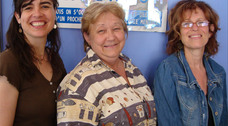2010-09-01

A young boy is the helpless witness to his father's depression and suicide attempts. He is so distressed that he feels guilty and starts thinking about taking his own life. This is the story of Belgian director Frédéric Dumont's Angel at Sea, which was screened in May during the 2010 Frames of Mind, a series of films on mental health presented by the Douglas Institute. The topic of the film indeed touched Gisèle Forget Bordron, Director of PABEMSOM, who attended the screening as an invited expert. "Our association does a lot to help children cope with this kind of difficulty. I found it useful to emphasize the importance of resilience and the work we do in this area," she said.
Founded over 20 years ago, PABEMSOM works with the families and loved ones of people with a mental health problem in the Sud-Ouest borough of Montreal (Côte Saint-Paul, LaSalle, Lachine, Pointe-Saint-Charles, Saint-Henri, Verdun, and Ville-Émard). The organization has cultivated a very special relationship with the Douglas, as it initially held all of its activities here at the Institute. Louise de Bellefeuille, RN, was the one who organized the first support groups in 1984. This community association promotes respect and empathy for the people who seek its services. Their primary goal is to support the families of people with a mental health problem that may or may not have been diagnosed.
A dedicated director
Gisèle Forget Bordron has devoted all of her energy to PABEMSOM since 1993. A psychotherapist by trade, she first worked in multiple areas at the organization, both as coordinator and counsellor. She then took a management training course and became director of the organization in 1997.
PABEMSOM has indeed grown over the years. At first, the grant money they received was only $23,000—today their funding is up to $130,000. However, membership has also increased to about 400 members. Their working capital is therefore insufficient to provide all members with quality services while supporting a team of three employees and thirty volunteers. Passion and dedication are needed if their projects are to become a reality.
"My mother suffered from borderline personality disorder," said Mrs. Bordron. "At the time, we didn't really talk about it, and help was almost non-existent. This is without a doubt what motivated me to help loved ones and families in a similar situation and to share my experience and expertise."
Adapted services
PABEMSOM offers various services to its members. First, people can have one-on-one sessions with a knowledgeable person to whom they can express their feelings and talk about their experiences. Family members and spouses can also take workshops led by a counsellor trained in the approach of Hélène Busque, a clinical CLSC psychologist and trainer for nearly 10 years. In one-on-one sessions, the counsellor gives families a variety of tools to help them progress and develop and to identify negative emotions that prevent the person from thriving in his or her living environment. Work is also done to enhance positive emotions and self-esteem. Support groups bring a together a number of people to share experiences on a particular topic. "The topic could be guilt, for example. The group leader suggests useful reading material and exercises and then follows up the next week," explained Mrs. Bordron.
Through its matching service, PABEMSOM puts people who are dealing with particular problems or the same issues in touch with one another. They can then call and help each other as needed. PABEMSOM also refers people to the right therapy services. Finally, the organization is authorized to make clinical assessments of dangerousness upon request from the information provided by family members who must appear in court and then go to a police station.
As PABEMSOM must find new sources of funding, a new service was recently introduced. The organization gives clients access to its computer graphics services to create such items as engraved plaques, trophies or certificates. The money raised goes in particular to respite services to allow the family members of a person with a mental illness to get a break from their everyday routines.
PABEMSOM proposes a number of concrete and original solutions to make daily problems more manageable and allow family members to regain control of their lives.
Partnerships with the Douglas and other organizations
This year, PABEMSOM collaborated for the very first time in the Douglas Institute's Frames of Mind event. As a panelist, Gisèle Forget Bordron answered questions from the public about depression and suicide. The expertise that PABEMSOM has gained in this field through its workshops for young children is what earned the director her invitation. Over the years, the Douglas and this community organization have collaborated in other ways, for example, as part of a symposium on confidentiality or for scientific research.
As she has been for the previous three years, PABEMSOM's director is again this year serving as Vice-President of the Fédération des familles et amis de la personne atteinte de maladie mentale (FFAPAMM), an organization made up of 40 provincial associations. This federation is politically active and is working in particular on a major project: the creation of a regulatory framework to ensure that basic quality services are equally accessible throughout the province. A dozen associations have already obtained accreditation, and PABEMSOM should receive theirs in the spring.


